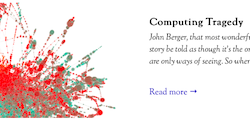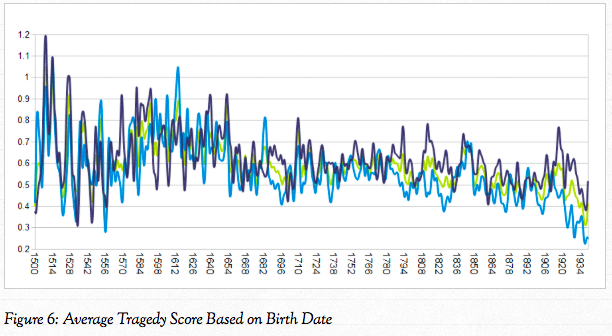 How does one bring tragedy into the story? In the case of Kindred Britain (on which I have previously written), the creators clearly state that this entire exercise is largely speculative – a great approach to humanities research! They have oversimplified – quite knowingly – in their choice of metrics, but identify this speculation clearly and involve the observer as engaged participant and critical consumer of the data. But is what they measure truly tragedy or is it life? I’d have to think long and hard about what tragedy connotes and where the temporal aspect clouds, exaggerates or mitigates our own judgement of life event experience. Grief would tie directly to a process of grieving but that is only one aspect of the phenomenon that are being caught in this attempt at a unifying metrification. The literary scholar will clearly find this discussion food for great thought. The social historian asks different questions of this through the temporal lens and this is how I view the discussion.
How does one bring tragedy into the story? In the case of Kindred Britain (on which I have previously written), the creators clearly state that this entire exercise is largely speculative – a great approach to humanities research! They have oversimplified – quite knowingly – in their choice of metrics, but identify this speculation clearly and involve the observer as engaged participant and critical consumer of the data. But is what they measure truly tragedy or is it life? I’d have to think long and hard about what tragedy connotes and where the temporal aspect clouds, exaggerates or mitigates our own judgement of life event experience. Grief would tie directly to a process of grieving but that is only one aspect of the phenomenon that are being caught in this attempt at a unifying metrification. The literary scholar will clearly find this discussion food for great thought. The social historian asks different questions of this through the temporal lens and this is how I view the discussion.
 The creators behind Kindred Britain define the concept of the Tragedy Index in an intriguing fashion. Simply stated it attempts to “summarize the level of tragedy in theirlives.” So, how can you compute tragedy? As I have lauded this project for previously, it includes fascinating and informative essays to accompany published datasets. The authors define tragedy algorithmically as early death, death of a child, death of a parent and/or semantic identification of the nature of the death of the individual as potentially violent. Intriguing. The challenge with so much of what is explored here (and one can appreciate the dataset from a statistical perspective in the essay on statistical methods and findings) is the self-reflexive nature of the measure. By the measure defined, declining infant mortality and longer lifespans alone over time mean that people experience less tragedy – does this make it easier or more difficult to weather tragedy in life? Does less mean it’s more difficult and that we are hardened by an experience? Can we connect the experience of tragedy to character definition? The authors don’t mean to infer anything by this admittedly and this is the beauty of the exercise. It’s out there to stimulate debate, refinement and also to embrace multiple uses of the derived values.
The creators behind Kindred Britain define the concept of the Tragedy Index in an intriguing fashion. Simply stated it attempts to “summarize the level of tragedy in theirlives.” So, how can you compute tragedy? As I have lauded this project for previously, it includes fascinating and informative essays to accompany published datasets. The authors define tragedy algorithmically as early death, death of a child, death of a parent and/or semantic identification of the nature of the death of the individual as potentially violent. Intriguing. The challenge with so much of what is explored here (and one can appreciate the dataset from a statistical perspective in the essay on statistical methods and findings) is the self-reflexive nature of the measure. By the measure defined, declining infant mortality and longer lifespans alone over time mean that people experience less tragedy – does this make it easier or more difficult to weather tragedy in life? Does less mean it’s more difficult and that we are hardened by an experience? Can we connect the experience of tragedy to character definition? The authors don’t mean to infer anything by this admittedly and this is the beauty of the exercise. It’s out there to stimulate debate, refinement and also to embrace multiple uses of the derived values.
